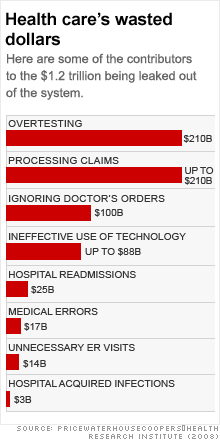
That's half of the $2.2 trillion the United States spends on health care each year, according to the most recent data from accounting firm PricewaterhouseCoopers' Health Research Institute.
What counts as waste? The report identified 16 different areas in which health care dollars are squandered. But in talking to doctors, nurses, hospital groups and patient advocacy groups, six areas totaling nearly $500 billion stood out as issues to be dealt with in the health care reform debate.
Doctors ordering tests or procedures not based on need but concern over liability or increasing their income is the biggest waste of health care dollars, costing the system at least $210 billion a year, according to the report. The problem is called "defensive medicine."
"Sometimes the motivation is to avoid malpractice suits, or to make more money because they are compensated more for doing more," said Dr. Arthur Garson, provost of the University of Virginia and former dean of its medical school. "Many are also convinced that doing more tests is the right thing to do."
"But any money that is spent on a patient that doesn't improve the outcome is a waste," said Garson.
Some conservatives have suggested that capping malpractice awards would help solve the problem.
President Obama doesn't agree; instead, his reform proposal encourages doctors to practice "evidence-based" guidelines as a way to scale back on unnecessary tests.
Inefficient claims processing is the second-biggest area of wasteful expenditure, costing as much as $210 billion annually, the PricewaterhouseCoopers report said.
"We spend a lot of time and money trying to get paid by insurers," said Dr. Terry McGenney, a Kansas City, Mo.-based family physician.
"Every insurance company has its own forms," McGenney said. "Some practices spend 40% of their revenue filling out paperwork that has nothing to do with patient care. So much of this could be automated."
Dr. Jason Dees, a family doctor in a private practice based in New Albany, Miss., said his office often resubmits claims that have been "magically denied."
"That adds to our administrative fees, extends the payment cycle and hurts our cash flow," he said.
Dees also spends a lot of time getting "pre-certification" from insurers to approve higher-priced procedures such as MRIs. "We're already operating on paper-thin margins and this takes times away from our patients," he said.
Susan Pisano, spokeswoman for America's Health Insurance Plans, said "hundreds of billions" of dollars can be saved by standardizing procedures and using technology -- something the White House has mentioned as a key to health care reform.









No comments:
Post a Comment